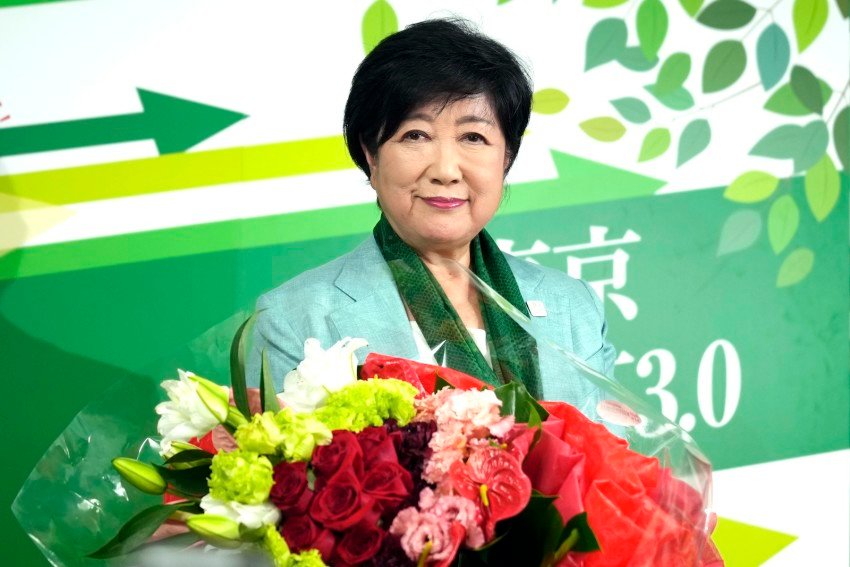Tokyo Gov Koike reelected, beating opposition Renho, rising ex-mayor
TOKYO – Incumbent Tokyo Gov. Yuriko Koike was reelected in Sunday’s gubernatorial election with the effective backing of the ruling party, signaling that voters have positively evaluated her policies centered on quality of life and political competence over the past eight years.
Koike, 71, secured a third consecutive four-year term, defeating Shinji Ishimaru, a 41-year-old social media-savvy former mayor from Hiroshima Prefecture, who closely contested second place with Renho, a 56-year-old former lawmaker backed by the main opposition party.
The election was initially expected to be a neck-and-neck race between Koike and Renho, both former TV anchors. However, Ishimaru, relatively unknown in Tokyo before the official campaign began, significantly boosted his profile by expanding his election activities through social media.
Ishimaru apparently garnered popularity from voters with no particular party affiliation as a recent political funds scandal eroded trust in politics, but it was not enough to catch up with Koike. After the polls closed, he spoke before a group of supporters and said, “I did all I could.”
Sunday’s election was closely watched as the outcome could affect the future course of national politics, with the Liberal Democratic Party, led by Prime Minister Fumio Kishida, under heavy scrutiny amid the slush funds scandal revealed late last year.
The race was also seen as a proxy war between national parties as the conservative incumbent was challenged by the left-leaning opposition politician, while the election was criticized for prioritizing popularity over policies due largely to swing voters.
In 2024, a record 56 people, including former Air Self-Defense Force chief Toshio Tamogami, 75, threw their hats into the ring. According to political pundits, many candidates entered the race solely to gain fame through campaign broadcasts and posters.
Some candidates in Tokyo’s gubernatorial race were criticized for making a mockery of the electoral process by posting sexually explicit posters or covering large parts of official campaigning boards with their materials, with some groups obstructing the election campaigns of others.
Koike told her supporters on Sunday, “I received threats and heckling. It was the toughest election campaign I have ever experienced,” emphasizing the necessity of amending legislation related to the electoral system.
All incumbents in past Tokyo gubernatorial elections who sought reelection have gone on to win, but this year’s race sparked enthusiasm among voters as they were able to choose from a diverse range of candidates.
After the media reported her loss, Renho said, “I was able to express my thoughts from the bottom of my heart thanks to the support of many people, and I did everything I could,” adding that Sunday’s result came “down to my lack of ability.”
The governor of Japan’s capital, home to around 14 million people, controls an annual budget of more than 16 trillion yen ($100 billion), nearly equivalent to the national spending of Sweden or the Czech Republic.
Koike became the first female Tokyo governor in 2016. The former LDP lawmaker was also Japan’s first female defense minister, while Renho was a member of the Constitutional Democratic Party of Japan before running in the gubernatorial election.
The LDP did not field its own candidate, as support for the ruling party has plummeted to its lowest levels since it returned to power in 2012 after a brief period in opposition. It decided to back Koike along with its junior coalition partner, the Komeito party.
Yuko Obuchi, the LDP’s election campaign chief, said Koike’s victory may “provide a big advantage in upcoming elections, but restoring trust in politics is still a work in progress,” with another party lawmaker saying, “This is not a triumph for the LDP.”
Renho who served as minister in charge of administrative reform under the three-year rule of the now-defunct Democratic Party of Japan from 2009, was backed by the CDPJ, the Japanese Communist Party and the Social Democratic Party.
A former banker, Ishimaru has attracted attention with his YouTube posts featuring fierce exchanges with municipal assembly members. He has broadened his support base among the younger generation and gathered thousands of volunteers for his campaign.
On the policy front, Koike has touted assistance measures for raising children, such as cash handout programs, as one of her achievements during her eight years in office. Critics, however, argue that she has not fulfilled most of her pledges from previous races.
In the latest election, Koike promised to concentrate primarily on supporting families and child-rearing, while Renho committed to enhancing policies to benefit those in the younger generation who wish to have children.
Renho contended that a core issue would be how to handle the controversial redevelopment of the Meiji Jingu Gaien district, which would involve demolishing two historic sports venues and tearing down hundreds of trees. Koike has greenlit the project.
Ishimaru, meanwhile, pitched himself as a candidate “well versed in economic theories and practices,” vowing to hand out 1 million yen to student council presidents of public high schools in Tokyo.
Asked about his future ambitions, he told reporters, “One option is to run” in a House of Representatives election “from the Hiroshima No. 1 district, which is Prime Minister Kishida’s constituency,” indicating the possibility of stepping into the national political arena.
Voter turnout in Sunday’s gubernatorial election was 60.62 percent, up from 55.00 percent in the 2020 race, the Tokyo metropolitan election management committee said.
© KYODO

